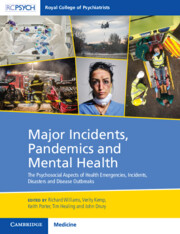 Major Incidents, Pandemics and Mental Health
Major Incidents, Pandemics and Mental Health Book contents
- Major Incidents, Pandemics and Mental Health
- Major Incidents, Pandemics and Mental Health
- Copyright page
- Dedication
- Contents
- Figures
- Tables
- Boxes
- Contributors
- Foreword by Dr Adrian James
- Foreword by Professor David Lockey
- Section 1 The Nature and Impacts of Twenty-First-Century Healthcare Emergencies
- Chapter 1 Emergencies, Incidents, Disasters, Disease Outbreaks, and Mental Health
- Chapter 2 How the World Views Trauma and Trauma Care
- Chapter 3 How the World Views the Mental Health Implications of Traumatic Events, Major Incidents, and Serious Contagious Diseases
- Chapter 4 Two Personal Perspectives on Trauma and Recovery
- Chapter 5 How Emergencies, Incidents, Disasters, and Disease Outbreaks Affect People and Healthcare Practitioners
- Chapter 6 The Impact of Emergencies, Terrorism, and Disease on Children and Their Families
- Chapter 7 The Impacts of Urbanising the World’s Population on Emergencies, Incidents, Disasters, and Disease Outbreaks
- Chapter 8 Myths About Disasters
- Chapter 9 Primary and Secondary Stressors
- Chapter 10 The Differing Challenges Posed by Big Bang, Rising Tide, and Longer-Term Incidents Affecting Local and Dispersed Populations
- Chapter 11 Mental Health in the Context of Multiple Exposures to Disasters
- Chapter 12 The Common Ground in the Mental Health Impacts of Emergencies, Incidents, Disasters, Disease Outbreaks, and Conflict, and a Framework for Responding to People’s Needs
- Section 2 Clinical Aspects of Traumatic Injuries, Epidemics, and Pandemics
- Section 3 The Role of the Public in Emergencies: Survivors, Bystanders, and Volunteers
- Section 4 Responses to Meet the Mental Health Needs of People Affected by Emergencies, Major Incidents, and Pandemics
- Section 5 Sustaining and Caring for Staff During Emergencies
- Section 6 Designing, Leading, and Managing Responses to Emergencies and Pandemics
- Section 7 Key Lessons for the Way Forward
- A Glossary of Selected Key Terms Used in This Book
- Index
- References
Chapter 3 - How the World Views the Mental Health Implications of Traumatic Events, Major Incidents, and Serious Contagious Diseases
from Section 1 - The Nature and Impacts of Twenty-First-Century Healthcare Emergencies
Published online by Cambridge University Press: 11 January 2024
- Major Incidents, Pandemics and Mental Health
- Major Incidents, Pandemics and Mental Health
- Copyright page
- Dedication
- Contents
- Figures
- Tables
- Boxes
- Contributors
- Foreword by Dr Adrian James
- Foreword by Professor David Lockey
- Section 1 The Nature and Impacts of Twenty-First-Century Healthcare Emergencies
- Chapter 1 Emergencies, Incidents, Disasters, Disease Outbreaks, and Mental Health
- Chapter 2 How the World Views Trauma and Trauma Care
- Chapter 3 How the World Views the Mental Health Implications of Traumatic Events, Major Incidents, and Serious Contagious Diseases
- Chapter 4 Two Personal Perspectives on Trauma and Recovery
- Chapter 5 How Emergencies, Incidents, Disasters, and Disease Outbreaks Affect People and Healthcare Practitioners
- Chapter 6 The Impact of Emergencies, Terrorism, and Disease on Children and Their Families
- Chapter 7 The Impacts of Urbanising the World’s Population on Emergencies, Incidents, Disasters, and Disease Outbreaks
- Chapter 8 Myths About Disasters
- Chapter 9 Primary and Secondary Stressors
- Chapter 10 The Differing Challenges Posed by Big Bang, Rising Tide, and Longer-Term Incidents Affecting Local and Dispersed Populations
- Chapter 11 Mental Health in the Context of Multiple Exposures to Disasters
- Chapter 12 The Common Ground in the Mental Health Impacts of Emergencies, Incidents, Disasters, Disease Outbreaks, and Conflict, and a Framework for Responding to People’s Needs
- Section 2 Clinical Aspects of Traumatic Injuries, Epidemics, and Pandemics
- Section 3 The Role of the Public in Emergencies: Survivors, Bystanders, and Volunteers
- Section 4 Responses to Meet the Mental Health Needs of People Affected by Emergencies, Major Incidents, and Pandemics
- Section 5 Sustaining and Caring for Staff During Emergencies
- Section 6 Designing, Leading, and Managing Responses to Emergencies and Pandemics
- Section 7 Key Lessons for the Way Forward
- A Glossary of Selected Key Terms Used in This Book
- Index
- References
Summary
I grew up in a divided community where people had conflicting views on many issues, because of their differing religious, political, social, and cultural backgrounds. As I trained in psychiatry, I learned how biological, psychological, and sociological perspectives competed for allegiance in the profession. Later the diversity of views within our scientific communities was brought home to me when I was invited by the World Federation of Scientists to help them with a major division that had opened up as they tried to apply their expertise in the aftermath of the 9/11 terrorist attacks. Western scientists wanted to assist in the fight against Al Qaeda, whereas those from Eastern countries insisted that we must understand why the attacks were taking place. These conflicting perspectives among scientists showed how, even within the rational scientific community, we develop different narratives to explain and explore traumatic events and major incidents.
- Type
- Chapter
- Information
- Major Incidents, Pandemics and Mental HealthThe Psychosocial Aspects of Health Emergencies, Incidents, Disasters and Disease Outbreaks, pp. 7 - 10Publisher: Cambridge University PressPrint publication year: 2024


